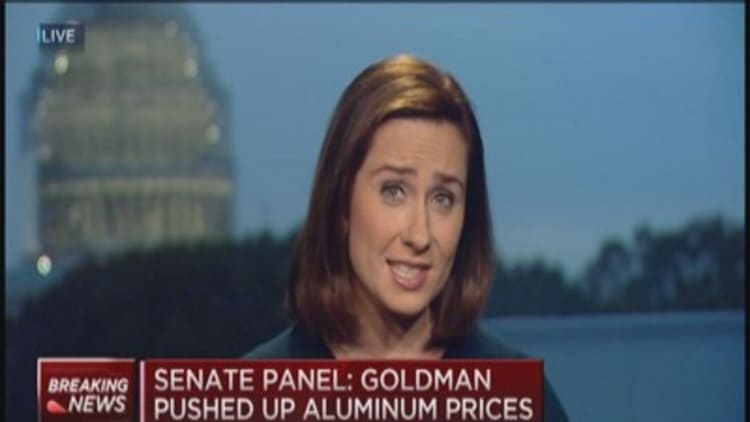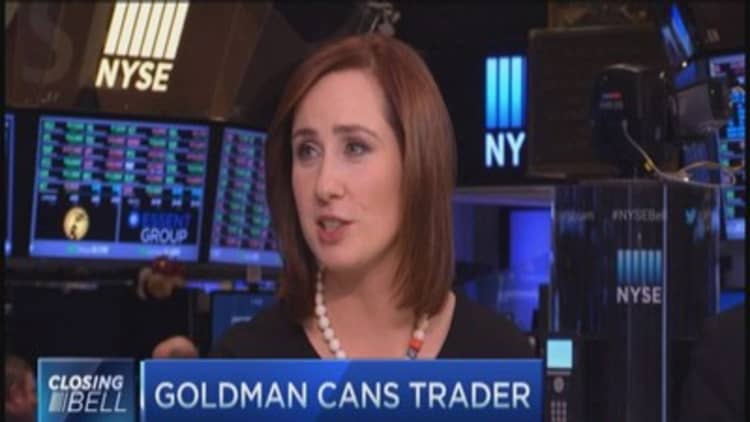
In a voluminous new report reflecting two years of research, an influential Senate panel accuses Goldman Sachs of manipulating aluminum storage rules in order to line its own pockets, even as manufacturers and customers suffered.
Since 2010, when it acquired the metal storage company Metro International Trade Services, Goldman has engaged in a slew of manipulative "merry-go-round" trades in which aluminum slabs are moved from one warehouse facility to another, says the 396-page report by the Senate Permanent Subcommittee on Investigations, resulting in record U.S. fees for storing and shipping aluminum and, as a result, higher overall costs for aluminum-product manufacturers and consumers.
"These merry-go-round transactions lengthened the metal load out queue to exit the Metro warehouse system [and] blocked the exits for other metal owners seeking to leave the system," states the report, unveiled at 5 p.m. on Wednesday in advance of a two-day hearing set to be held on the subject in Washington, D.C.
Read MoreNext for banks: Layoffs, chat smackdown, more regs
Those actions, combined with "extensive aluminum trading" that Goldman engaged in in the aluminum market during that period, the report adds, have "given rise to serious questions about the integrity of the aluminum market."
Early in the week of the report's release, the Senate hearings were already promising to be contentious. In its own 31-page position paper, prepared in advance of the release of the subcommittee's report, Goldman officials defended their actions with Metro and other commodity businesses. "The queues were the result of metal owners' independent, financially-motivated decisions to remove metal that had been placed in Metro's warehouses," the report stated. "Like any other landlord, Metro was merely competing for tenants."
Goldman enhanced its own profits in the physical storage and trading of aluminum, the Senate panel report argues, by purchasing Metro, a longtime warehousing business that stores aluminum, copper, zinc, and other base metals around the U.S.; stacking Metro's board exclusively with Goldman executives; and then striking backroom deals with aluminum owners like the international trading firm Glencore and the London hedge fund Red Kite.
Those deals allowed Metro to remove each client's aluminum from one Metro warehouse and move it shortly thereafter into another—tying up its ground transportation systems and creating substantial delays for other clients wanting to ship metal out of storage.

A spokesman for Glencore declined to comment, and officials at Red Kite did not respond to a written request for comment.
The long waits that resulted, the report says, led to record surcharges for storing and shipping aluminum in the U.S. Those costs are tracked by a pricing system called the Midwest Premium that recently hit an all-time high of 23.5 cents per pound, according to research by CRU Group, a commodities consulting and data firm.
In remarks earlier Wednesday, Carl Levin, the Democratic Senator from Michigan and longtime chairman of the subcommittee, was unsparing in his view of Goldman and its aluminum business. "Goldman's warehouse operations were being manipulated to lengthen the queue," he said, at a time when Goldman was also "expanding its own trading in aluminum and aluminum-related financial products."
Levin, who is planning to retire from the Senate in January after a 35-year career, has made commodity trading a key focus of the Subcommittee on Investigations, which he runs alongside Arizona Senator John McCain, the ranking Republican.
Wednesday's report is the panel's eighth in recent years to deal with the topic; it grapples with alleged manipulation, conflicts of interest, regulatory dodges, and other issues at three of the nation's biggest banks—Goldman, Morgan Stanley and JPMorgan Chase.
Read More What corporate tax reform may look like in 2015
Among other things, the report argues the following:
- That until recently, Morgan Stanley "controlled" over 55 million barrels of oil storage capacity, 100 oil tankers, and 6,000 miles of pipeline. Those holdings provided it a unique—and risky—vantage point that, according to Levin on Wednesday, rivaled that of major oil companies, exposing it to catastrophic events that could have threatened the U.S. financial system;
- That JPMorgan, after acquiring over 30 U.S. power plants, became involved with "manipulating electricity payments and blocking plant modifications" that would have improved the reliability of power for the public;
- That JPMorgan has tried to establish a copper-backed exchange-traded fund that could potentially create "artificial copper shortages" and increase prices;
- That JPMorgan used exploited loopholes and other "valuation minimalization techniques" to underplay the size of its physical commodity holdings and stay within regulatory parameters.
The scrutiny comes at a time when the Federal Reserve is considering curbing U.S. banks' ability to own physical commodity assets like pipelines and metal warehouses.
Beginning Thursday at 9:30 a.m. on Capitol Hill, Levin will interview witnesses on some of the key questions raised in the subcommittee's latest report—including, perhaps most prominently, the alleged misconduct by Goldman in the physical aluminum realm.
Read MoreFed to big banks: Clean up your act or you're done
Nick Madden, a supply-chain executive at the privately held aluminum manufacturer Novelis who has criticized the long waits for metal and subsequent price hikes, is expected to testify Thursday about the problems raised by players like Goldman, among other things.
And Daniel Tarullo, a Federal Reserve Governor who has been closely involved with the central bank's handling of bank commodity rules, is expected to testify on Friday.
CORRECTION: This story was updated to say Wednesday's Senate report is the panel's eighth in recent years to deal with the topic.


